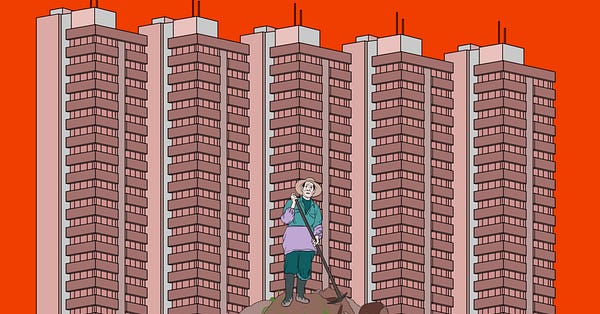Welcome to the 76th edition of Trade War.
Devastating floods in Zhengzhou, Henan force closures at Apple supplier and hit migrant workers hard; Concerns grow that other Chinese cities are equally vulnerable to climate change-induced disasters.
Officials in China slap retaliatory sanctions on U.S. citizens even as trade between the two countries soars. And China may see birth rates drop further this year, hurting its economy.
Devastating floods a wake up call
The devastating floods in Zhengzhou, Henan that have killed at least 51 people so far are an alarming foretaste of possible future disasters in China, reports Reuters.
“Official data shows about 98% of China's 654 major cities are vulnerable to flooding and water-logging, with rapid growth in recent decades creating urban sprawls that covered floodplains with impermeable concrete,” reports Reuters, noting that almost two-thirds of China’s 1.4 billion people live in cities, up from a third two decades ago.
According to a report issued earlier this month, more than 6,700 reservoirs have been reinforced and drainage infrastructure will be added to 53 flood-prone sites near the Yangtze River.
"Because of global climate change, the rainfall statistics will continue to break new records in the future," Zhou Jinfeng, Secretary-General of the China Biodiversity Conservation and Green Development Foundation (CBCGDF) said.


Foxconn facilities affected by rising waters
Two of Apple supplier Foxconn’s Zhengzhou facilities had to shut temporarily because of the flooding while its largest plant remained open, reports the South China Morning Post.
Tens of thousands of workers at Foxconn’s factories in Zhongmu county and the Zhengzhou Export Processing Zone had to stay home as flood waters filled their workplaces. According to online reports, “workers were seen wading knee-deep through water while departing the [Zhongmu] plant,” the Hong Kong paper writes.
“Zhengzhou, a city of 10 million people, is often dubbed iPhone City, because more than half of Apple’s smartphones are assembled there at Foxconn facilities.”
Foxconn is “closely monitoring the situation” while its largest facility had seen “no direct impact,” the Taipei-based company said in a statement.


China migrants hard hit
China’s migrant workers have been hit particularly hard by the Zhengzhou floods, out of work and unable to travel home, reports Reuters.
“They must stay put, tied to livelihoods in inundated parts of the city and living too far away from families to reach them when transportation is so badly disrupted,” writes the news service. “That means surviving without power and running water for days and counting, difficulty moving around Zhengzhou and mounting worry over how they are going to get back to work.”
"Some people have ... relatives nearby they can go to. For us non-locals, leaving is not easy. We have no way of going home, and we have no work at home," a 40-year-old construction worker told Reuters.
A second migrant who invested her life savings of 200,000 yuan into a noodle restaurant opened just before the floods has seen the family business devastated.
"All the electrical appliances are ruined. It's too hard," she told Reuters, almost in tears. "I have to stay. My husband is working here and my children go to school here."


China’s view: Biden worse than Trump
There is a growing consensus in Beijing that Biden is worse for China than Trump was, reports the New York Times.
Recent efforts targeting China include more sanctions and export controls related to Xinjiang, the warning to American companies operating in Hong Kong, and visa refusals to students and researchers over possible People’s Liberation Army links.
Particularly upsetting from Beijing’s perspective: “Mr. Biden has taken a more strategic approach than his predecessor, enlisting allies to join his campaign against Chinese behavior in ways that appear to have frustrated officials.”
China for its part has retaliated with sanctions against U.S. and European officials and stepped up military activity near Taiwan and in the South China Sea.
“Although both sides have said that they want to avoid a new Cold War, they are plunging into an increasingly ideological conflict that shows little sign of easing. The result has been a deterioration of relations that, to the surprise of many in Beijing, has surpassed even the four tumultuous years of dealing with President Donald J. Trump.”


New retaliatory Chinese sanctions
China has slapped sanctions on seven people and entities, including former U.S. commerce secretary Wilbur Ross, in retaliation to Biden’s recent warning on companies in Hong Kong, reports Bloomberg News.
“The U.S. has concocted the so-called ‘Hong Kong Business Advisory’ to groundlessly smear Hong Kong’s business environment, and illegally imposed sanctions on several officials,” according to the statement. “In response to the erroneous practice of the U.S. side, China has decided to take reciprocal countermeasures.”
Along with the 83-year-old Ross, the sanctions also named Carolyn Bartholomew, chairman of U.S.-China Economic and Security Review Commission and Human Rights Watch’s Sophie Richardson.
The U.S. remains “undeterred by these actions” which only show China’s “deteriorating investment climate and rising political risk,” said White House Press Secretary Jen Psaki.

What Trade War? US-China buying soars
Even as the U.S.-China relationship worsens, trade between the two countries is soaring, reports Bloomberg News.
“China and the U.S. are shipping goods to each other at the briskest pace in years, making the world’s largest bilateral trade relationship look as if the protracted tariff war and pandemic never happened.”
Monthly trade is reaching new records and is expected to keep growing “with China purchasing millions of tons of U.S. farm goods for this year and next and stuck-at-home U.S. consumers still shopping and importing in record amounts,” buying up clothing and electronic products.
“We’ve seen the strong consumer demand that’s been occurring throughout the pandemic, and we’ve seen the import levels just go through the roof,” National Retail Federation’s Jonathan Gold said.
All this buying has little to nothing to do with the so-called “phase one” trade agreement signed early last year by the two countries, which is “pretty irrelevant at this stage,” according to the Peterson Institute for International Economics Chad Bown.
“China buys what China needs,” Bown said. “If it’s buying more of certain American products, it’s doing so probably out of its own interest.”


Death knell for Chinese IPOs in the US?
Two decades of China’s top companies choosing to list on American stock exchanges may be coming to an end, reports Bloomberg News.
Drawn by “a friendly regulatory environment and a vast pool of capital eager to invest in one of the world’s fastest-growing economies,” over 400 Chinese companies have gone public in the U.S. “Now, the juggernaut behind hundreds of companies worth $2 trillion appears stopped in its tracks,” reports the financial news service.
“Beijing’s July 10 announcement that almost all businesses trying to go public in another country will require approval from a newly empowered cybersecurity regulator amounts to a death knell for Chinese initial public offerings in the U.S.”
“It’s unlikely there will be any U.S.-listed Chinese companies in five to 10 years, other than perhaps a few big ones with secondary listings,” Peking University’s Paul Gillis told Bloomberg.
Hong Kong will likely be the biggest beneficiary, particularly now that Beijing will not require its IPOs to get the approval from the cybersecurity regulator, Bloomberg reported recently.

Baby shortage could hit consumption, economic growth
Even as Beijing moves to loosen birth restrictions and encourage families to have more children, the number of babies born in China is expected to keep falling, says a Chinese health official, reports Bloomberg News.
“Fertility levels and new births are expected to keep falling this year, based on our monitoring of birth and population in the first half of 2021,” National Health Commission official Yu Xuejun said at a briefing in Beijing.
“The announcement came a day after the government said it would try to make it cheaper to raise children and would get rid of fines and punishments for married couples who had a third child. The declining birthrate means China’s population, currently at 1.41 billion, may begin to shrink before 2025, according to Bloomberg Economics’ estimates.”
“We will face a shift in labor supply from abundance to shortage,” People’s Bank of China policy board member and prominent economist Cai Fang said in a recent speech. “Economic growth may be constrained by lagging consumer demand.”
“As China’s labor force gradually loses its competitiveness and our demographic dividend begins to disappear, the only thing we can rely on is to increase productivity.”
Notable/In Depth
A crackdown by Xi Jinping on organized crime could further undermine China’s already beleaguered private sector, reports the Wall Street Journal’s Chun Han Wong.
“For decades, entrepreneurs in China “always thought that tomorrow will be better,” but shifting political winds have since cast a pall on business confidence, the founder of a prominent Chinese technology company said in response to Mr. Xi’s campaign. “We are all small-time businessmen in the eyes of government officials,” he said.


The gig economy, where an increasingly large number of the country’s migrants work for China’s food delivery and ride-hailing tech giants, should be unionized, says the official union, reports the South China Morning Post’s Masha Borak.
This call comes even as the Chinese government has “a strict ban on any kind of spontaneous labour union formation or strikes by gig economy workers,” and recently arrested a prominent gig economy activist.


How the CCP tries to balance creating a Chinese military that can protect it against domestic threats such as a coup d’etat or a popular uprising, and building a world-class fighting force, is examined in this fascinating paper by Yale University professor Dan Mattingly.


“Myth of Chinese Capitalism” shout-out
"Dexter Roberts’ book The Myth of Chinese Capitalism does precisely this, detailing, for example, the effect of the hukou and the funding issues affecting rural education, and I highly recommend it," writes Mike Cormack in SupChina.




